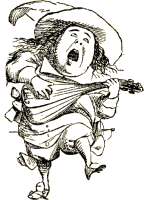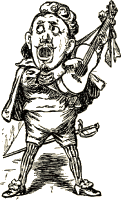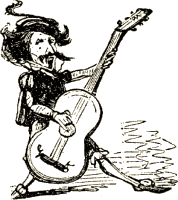Bardspotting for the Novice
by HRM Leticia Carbuncle Pennywhistle-Crumphorn

As an experienced Bardspotter, I think it's important that we help our new enthusiasts. So many rush out to buy the latest gizmos, or spend hours in unrewarding locations, only to see the most basic of bards. Balderdash!
Here are some tips for successfully spotting some of our more colorful Bards. In no time, you'll be hearing the Sonorous Drone of the Rhino Bard, the full throated warble of the Period Diva, or the brilliant display of the "Flavor of the Moment".
First: Location, Location, Location! Bards are very picky about where they hunt, sing, and gather. Most people know that they can be found at bardic circles, wars, revels, and other SCA events. Any grouping of people can attract them, while they hunt their natural prey, "The Audience". I have found great success in training yourself to find audiences. The sound of an audience applauding is one of the sweetest sounds to a bard. If you don't have an audience nearby, gather some friends, and applaud, laugh uproariously, and so on. Like magic, they will appear.
Certain calls will draw them as well. Favorites include; "I'm sooooo bored." "What am I going to do with all this booze" "Does anybody know a song?" "If only I had someone to Idolize" These calls have all worked well... but be warned, the Booze call may summon "Boozehounds" (Boozehound Schtickjockius) and they will often scare Bards away, and bring Drummers* and other audience predators.
[*Drummers are the natural enemy of Bards, and often bring other Audience Predators including Dancers (including species like the lesser GypsyGothFairy, the AbundantScantyclad, and the Veiled Jabbahut)]
Decorate the area with a free chair by the fire, a buffet, and nubile/virile groupies and other natural attractors, and wait for them to come. Every area has unique species, although some have variants around the knowne world. One of the first to show will almost certainly be...

"The Armor Plated Rhino Bard" (Egoistus Omniscients) The Rhino bard is usually a larger bard, with ornate plumage. They are easily identified by their Huge Tomes of Music. They have long lifespans, and don't fear much. Unfortunately, they are rather clueless, and tend to sing long after the audience has fled. They are often followed by Gilded Sychophants, and at least one or two Fledgling Rhino Bards, attempting to mimic the territorial patterns of the Rhino Bard. Once they have settled in, nothing short of a pole-arm, or actually putting your camp dark will make them retreat. Some people have resorted to using tape recordings of audiences applauding, or of the Rhino Bard itself (it can't resist its own voice) to pull it away from its prey. Usual Song: "MoooseMoooseIwannaMoooose" Females of the Species must be praised more and tend to be less migratory, but are quick to defend their territory.
The "Ruby-Throated Diva" or the Rarer "Period Diva" (Laurelheralpelicanicus Sniffingnor) can occasionally be spotted near audiences in the West. The Ruby-Throated Diva can be spotted in areas frequented by Royals, and don't prefer the rough and tumble of the wild Audience. When prompted by calls of Loyal Sycophants, "Oh please, you must, you must!" the Ruby-Throated Diva will strike a pose and let loose a veritable torrent of song. The Diva will usually stay as long as she has a captive audience and constant stroking, and will not abide another Diva in her territory for long. Differentiating between the more common Ruby and the Period Diva can be done by studying their songs. Period Divas have songs with glottal stops and unique phrasings, usually in Italian or German, although both have songs that are usually ornate and histrionic but unintelligible. Period Divas usually travel with Gilded Sycophants, discernible by their sniffing and calls of "She has a Doctorate, you know..." Male Divas are rarer still with small patches of blue feathers, and ornate shows of medallions and period instruments. Songs of both sexes usually include the words "Amoouurrrrr...Amouurrrrr" among others.

Full Chested Flavor of the Moment (Nubiletum Teaseatorium) Known by many names (including the Big Breasted Twinkie, the Long Haired Mimbo) these social rapscallions are known for taking the mates of other species, and having a flock of followers panting "She's a singer you know, she sings" or begging them to preen before the audience. If we are lucky we may be favored by a song. Unfortunately, the Flavor bard has a very limited repertoire of one or two songs. Fortunately, this breed is highly migratory, and is usually not around for very long. Their songs are usually mimicked from recent celtic bands and sung in minor keys. "Loooook at Meeeeee, Looovvveee Me..." This bard has powerful plumage that make normally sensible people act like utter idiots. Should they not break free, they too will flock around the "flavor of the moment" begging for performances.
There are many other rare Bards to be spotted in your area, and I will continue in the second half of this article!
HRM Leticia Carbuncle Pennywhistle-Crumphorn has been in the SCA since before its creation, thank you. If you were enlightened enough to have met her, you would know that she is one of the founding members of the Royal Bardspotting Academy. Her degrees include FUBa, and WubA's. She is terribly fond of Gentian Violet Crisps, and Crystallized Fruit, but not Ginger.
